
- •Contents
- •Thanks
- •To the student
- •To the teacher
- •3 Present continuous and present simple 1 (I am doing and I do)
- •10 Present perfect continuous and simple (I have been doing and I have done)
- •11 how long have you (been) … ?
- •12 for and since when … ? and how long … ?
- •13 Present perfect and past 1 (I have done and I did)
- •14 Present perfect and past 2 (I have done and I did)
- •15 Past perfect (I had done)
- •16 Past perfect continuous (I had been doing)
- •17 have and have got
- •18 used to (do)
- •19 Present tenses (I am doing / I do) for the future
- •20 I’m going to (do)
- •21 will and shall 1
- •22 will and shall 2
- •23 I will and I’m going to
- •24 will be doing and will have done
- •26 can, could and (be) able to
- •27 could (do) and could have (done)
- •28 must and can’t
- •29 may and might 1
- •30 may and might 2
- •31 have to and must
- •32 must mustn’t needn’t
- •33 should 1
- •34 should 2
- •35 I’d better … it’s time …
- •36 would
- •39 if I knew … I wish I knew …
- •40 if I had known … I wish I had known …
- •41 wish
- •42 Passive 1 (is done / was done)
- •43 Passive 2 (be done / been done / being done)
- •44 Passive 3
- •45 it is said that … he is said to … he is supposed to …
- •46 have something done
- •47 Reported speech 1 (he said that …)
- •48 Reported speech 2
- •49 Questions 1
- •52 Question tags (do you? isn’t it? etc.)
- •53 Verb + -ing (enjoy doing / stop doing etc.)
- •54 Verb + to … (decide to … / forget to … etc.)
- •55 Verb (+ object) + to … (I want you to …)
- •56 Verb + -ing or to … 1 (remember, regret etc.)
- •57 Verb + -ing or to … 2 (try, need, help)
- •58 Verb + -ing or to … 3 (like / would like etc.)
- •59 prefer and would rather
- •60 Preposition (in/for/about etc.) + -ing
- •61 be/get used to … (I’m used to …)
- •63 there’s no point in -ing, it’s worth -ing etc.
- •64 to … , for … and so that …
- •65 Adjective + to …
- •66 to … (afraid to do) and preposition + -ing (afraid of -ing)
- •67 see somebody do and see somebody doing
- •68 -ing clauses (He hurt his knee playing football.)
- •69 Countable and uncountable 1
- •70 Countable and uncountable 2
- •71 Countable nouns with a/an and some
- •74 the 2 (school / the school etc.)
- •75 the 3 (children / the children)
- •77 Names with and without the 1
- •78 Names with and without the 2
- •79 Singular and plural
- •80 Noun + noun (a bus driver / a headache)
- •81 -’s (your sister’s name) and of … (the name of the book)
- •82 myself/yourself/themselves etc.
- •83 a friend of mine my own house on my own / by myself
- •84 there … and it …
- •85 some and any
- •87 much, many, little, few, a lot, plenty
- •90 all every whole
- •91 each and every
- •92 Relative clauses 1: clauses with who/that/which
- •94 Relative clauses 3: whose/whom/where
- •95 Relative clauses 4: extra information clauses (1)
- •96 Relative clauses 5: extra information clauses (2)
- •97 -ing and -ed clauses (the woman talking to Tom, the boy injured in the accident)
- •98 Adjectives ending in -ing and -ed (boring/bored etc.)
- •99 Adjectives: a nice new house, you look tired
- •100 Adjectives and adverbs 1 (quick/quickly)
- •102 so and such
- •104 quite, pretty, rather and fairly
- •105 Comparative 1 (cheaper, more expensive etc.)
- •106 Comparative 2 (much better / any better etc.)
- •107 Comparative 3 (as … as / than)
- •108 Superlative (the longest / the most enjoyable etc.)
- •109 Word order 1: verb + object; place and time
- •110 Word order 2: adverbs with the verb
- •111 still any more yet already
- •112 even
- •114 in case
- •116 as (as I walked … / as I was … etc.)
- •117 like and as
- •119 during for while
- •121 at/on/in (time)
- •122 on time and in time at the end and in the end
- •123 in/at/on (position) 1
- •124 in/at/on (position) 2
- •125 in/at/on (position) 3
- •126 to, at, in and into
- •127 in/on/at (other uses)
- •129 Noun + preposition (reason for, cause of etc.)
- •130 Adjective + preposition 1
- •131 Adjective + preposition 2
- •132 Verb + preposition 1 to and at
- •134 Verb + preposition 3 about and of
- •135 Verb + preposition 4 of/for/from/on
- •136 Verb + preposition 5 in/into/with/to/on
- •137 Phrasal verbs 1 Introduction
- •138 Phrasal verbs 2 in/out
- •139 Phrasal verbs 3 out
- •142 Phrasal verbs 6 up/down
- •143 Phrasal verbs 7 up (1)
- •144 Phrasal verbs 8 up (2)
- •145 Phrasal verbs 9 away/back
- •Additional exercises
- •Study guide
- •Key to Exercises
- •Key to Additional exercises (see page 302)
- •Key to Study guide
- •Index

Unit
49 Questions 1
AIn questions the subject is usually ater the first verb:
subject |
+ verb |
|
verb + |
subject |
|
|
|
|
|
Tom |
will |
→ |
will |
Tom? |
you |
have |
→ |
have |
you? |
the house |
was |
→ |
was |
the house? |
|
|
|
|
|
The subject is ater the first verb:
Is Katherine working today? (not Is working Katherine)
Will Tom be here tomorrow? Have you been working hard? When was the house built?
B In present simple questions, we use do/does:
you |
live |
→ |
do |
you live? |
|
the film |
starts |
→ |
does |
the film start? |
|
|
|
|
|||
In past simple questions, we use did: |
|
|
|||
|
|
|
|
|
|
you |
sold |
→ |
did |
you sell? |
|
the train |
stopped → |
did |
the train stop? |
|
|
|
|
|
|
|
|
Do you live near here?
What time does the film start?
Did you sell your car? Why did the train stop?
But do not use do/does/did if who/what etc. is the subject of the sentence. Compare:
who object |
|
who subject |
|||||||||||||||
|
|
|
|
|
|
|
|
|
|||||||||
Emma phoned |
somebody |
. |
|
|
|
|
Somebody |
phoned Emma. |
|||||||||
|
|
|
|
|
object |
|
|
|
|
|
|
subject |
|
|
|
phoned Emma? |
|
|
Who |
did Emma phone? |
|
|
|
|
Who |
||||||||||
|
|
|
|
|
|
|
|
|
|
|
|
|
|
|
|
|
|
|
|
|
|
|
|
|
|
|
|
|
|
|
|
|
|
|
|
In these examples, who/what etc. is the subject:
Who wants something to eat? (not Who does want)
What happened to you last night? (not What did happen)
How many people came to the party? (not did come)
Which bus goes to the centre? (not does go)
CIn questions beginning who/what/which/where, prepositions (in, for etc.) usually go at the end:
Where are you from?
Who do you want to speak to?
You can use preposition + whom in formal style: To whom do you wish to speak?
What was the weather like? Which job has Tina applied for?
Disn’t it … ? / didn’t you … ? etc. (negative questions)
We use negative questions especially to show surprise:
 Didn’t you hear the doorbell? I rang it three times. or when we expect the listener to agree with us:
Didn’t you hear the doorbell? I rang it three times. or when we expect the listener to agree with us:
‘Haven’t we met before?’ ‘Yes, I think we have.’
Note the meaning of yes and no in answers to negative questions:
‘Yes.’ (= Yes, I want to go) ‘Don’t you want to go?’ ‘No.’ (= No, I don’t want to go)
We oten use negative questions with Why … ? :
Why don’t we eat out tonight? (not Why we don’t eat)
Why wasn’t Emma at work yesterday? (not Why Emma wasn’t)
98 |
Questions 2 Unit 50 Question tags (do you? isn’t it? etc.) Unit 52 |
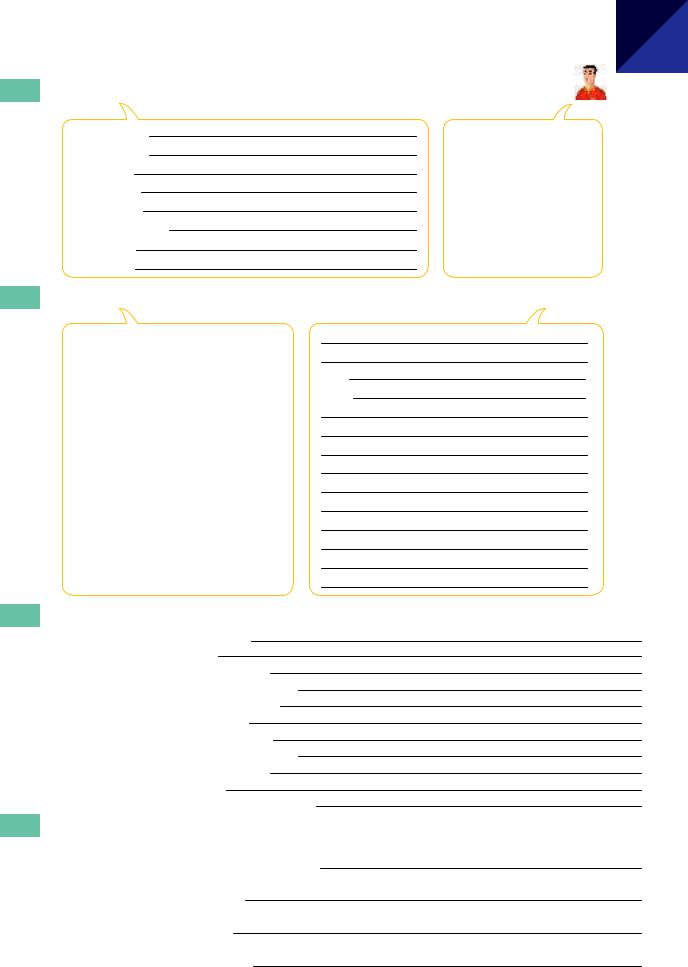
Exercises
49.1 Ask Joe questions.
|
|
JOE |
1 |
(where / live) Where do you live? |
In Manchester. |
2 |
(born there?) |
No, I was born in London. |
3 |
(married?) |
Yes. |
4 |
(how long?) |
17 years. |
5 |
(what / do?) |
I’m a journalist. |
6 |
(what wife / do?) |
She’s a doctor. |
7 |
(children?) |
Yes, two boys. |
8 |
(how old?) |
12 and 15. |
49.2 Make questions with who or what.
1 |
Somebody hit me. |
Who hit you? |
2 |
I hit somebody. |
Who did you hit? |
3 |
Somebody paid the bill. |
Who |
4 |
I’m worried about something. |
What |
5 |
Something happened. |
|
6 |
Diane said something. |
|
7This book belongs to somebody.
8Somebody lives in that house.
9 |
I fell over something. |
10Something fell of the shelf.
11This word means something.
12Sarah was with somebody.
13I’m looking for something.
14Emma reminds me of somebody.
49.3Put the words in brackets in the correct order.
1 (when / was / built / this house?)
2 (how / cheese / is / made?)
3 (why / Sue / working / isn’t / today?)
4 (what time / arriving / your friends / are?) 5 (why / was / cancelled / the meeting?)
6 (when / invented / paper / was?)
7 (where / your parents / were / born?)
8 (why / you / to the party / didn’t / come?) 9 (how / the accident / did / happen?)
10(why / happy / you / aren’t?)
11(how many / speak / can / languages / you?)
49.4Write negative questions from the words in brackets. In each situation you are surprised.
1 a: We won’t see Lisa this evening.
b: Why not? (she / not / come / out with us?) Isn’t she coming out with us?
2a: I hope we don’t meet Luke tonight. b: Why? (you / not / like / him?)
3a: Don’t go and see that film. b: Why not? (it / not / good?)
4a: I’ll have to borrow some money. b: Why? (you / not / have / any?)
Unit
49
99
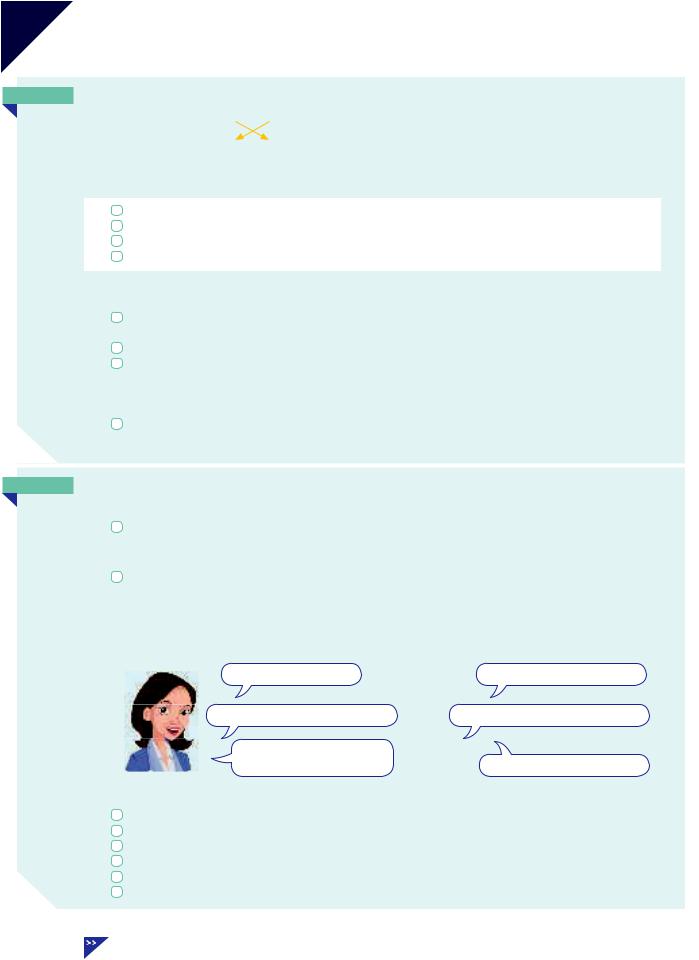
|
Unit |
|
|
Questions 2 (do you know where … ? / |
|
|
50 |
he asked me where …) |
|
|
|
ADo you know where … ? / I don’t know why … / Could you tell me what … ? etc.
We say: |
Where has Tom gone? |
but Do you know where Tom has gone? (not has Tom gone)
When the question (Where has Tom gone?) is part of a longer sentence (Do you know … ? /
I don’t know … / Can you tell me … ? etc.), the word order changes. We say:
What time is it?
Who are those people? Where can I find Louise? How much will it cost?
but Do you know what time it is?
I don’t know who those people are. Can you tell me where I can find Louise?
Do you have any idea how much it will cost?
Be careful with do/does/did questions. We say:
What time does the film start? |
but Do you know what time the film starts? |
|
(not does the film start) |
What do you mean? |
Please explain what you mean. |
Why did she leave early? |
I wonder why she let early. |
|
|
Use if or whether where there is no other question word (what, why etc.): |
|
|
|
Did anybody see you? |
but I don’t know if anybody saw me. |
|
or … whether anybody saw me. |
|
|
BHe asked me where …
The same changes in word order happen in questions in reported speech. Compare:
direct |
The police of icer said to us ‘Where |
are you going |
?’ |
||||||||
|
The police of icer asked us where |
|
|
|
|
|
. |
|
|||
reported |
we were going |
|
|||||||||
|
|
|
|
||||||||
direct |
Clare asked ‘What time |
do the shops close |
?’ |
||||||||
|
Clare wanted to know what time |
|
|
|
|
|
|
|
. |
||
reported |
the shops closed |
||||||||||
In reported speech the verb usually changes to the past (were, closed etc.). See Unit 47.
Study these examples. You had a job interview and the interviewer asked you these questions:
Are you willing to travel? |
Why did you apply for the job? |
What do you do in your spare time?
How long have you been working in your present job?
Can you speak any other languages?
Do you have a driving licence?
Later you tell a friend what the interviewer asked you. You use reported speech:
She asked if (or whether) I was willing to travel.
She wanted to know what I did in my spare time.
She asked how long I had been working in my present job.
She asked why I had applied for the job. or … why I applied …
She wanted to know if (or whether) I could speak any other languages. She asked if (or whether) I had a driving licence.
100 |
Reported speech Units 47–48 |
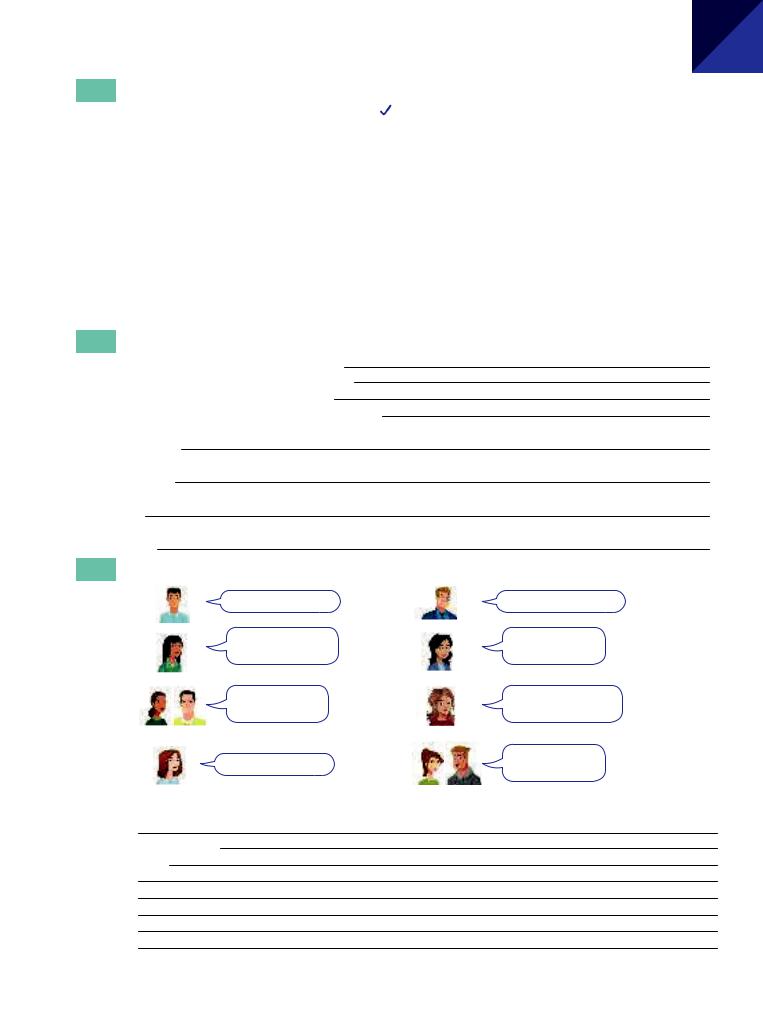
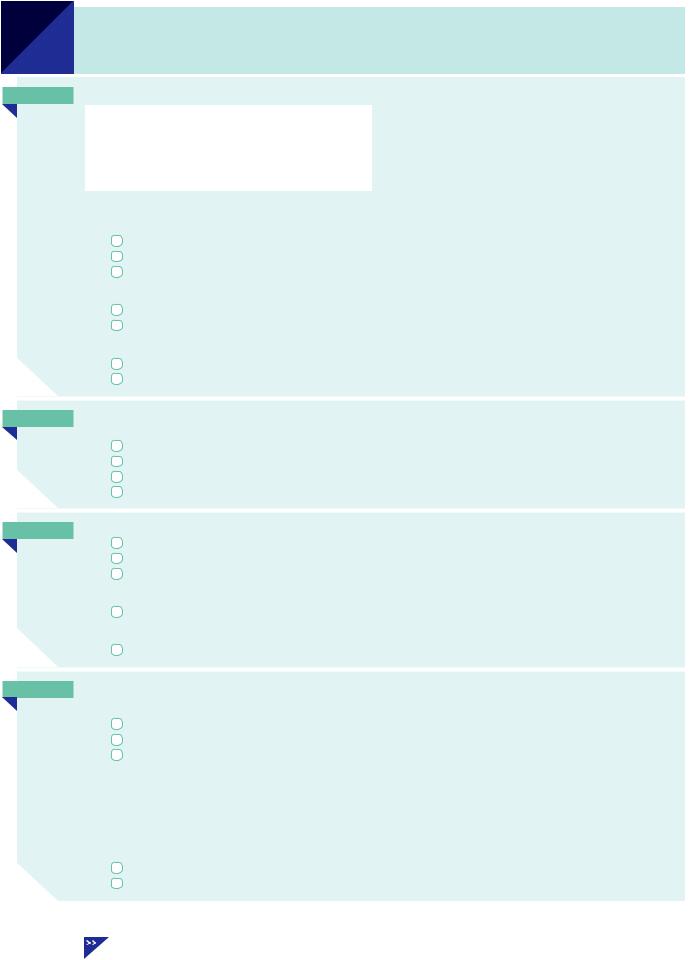
Unit
51
A
Auxiliary verbs (have/do/can etc.)
I think so / I hope so etc.
In these sentences there is an auxiliary verb and a main verb:
|
auxiliary |
main |
|
I |
have |
lost |
my keys. |
She |
can’t |
come |
to the party. |
The hotel |
was |
built |
ten years ago. |
Why |
do you |
want |
to go home? |
|
|
|
|
In these examples have/can’t/was/do are auxiliary (= helping) verbs.
You can use an auxiliary verb when you don’t want to repeat something:
‘Have you locked the door?’ ‘Yes, I have.’ (= I have locked the door)
Gary wasn’t working, but Laura was. (= Laura was working)
Jessica could lend me the money, but she won’t. (= she won’t lend me the money)
We use do/does/did for the present and past simple:
‘Do you like onions?’ ‘Yes, I do.’ (= I like onions)
‘Does Simon live in London?’ ‘He did, but he doesn’t any more.’
You can use auxiliary verbs to deny what somebody says (= say it is not true):
‘You’re sitting in my place.’ ‘No, I’m not.’ |
(= I’m not sitting in your place) |
‘You didn’t lock the door before you let.’ |
‘Yes, I did.’ (= I locked the door) |
BWe use have you? / isn’t she? / are they? etc. to show that we are interested in what somebody has said,
or to show surprise: |
|
‘I’ve just seen Steven.’ ‘Oh, have you? |
How is he?’ |
‘Lisa isn’t very well today.’ ‘Isn’t she? |
What’s wrong with her?’ |
‘It rained every day during our holiday.’ |
‘Did it? What a shame!’ |
‘James and Tanya are getting married.’ |
‘Are they? Really?’ |
CWe use auxiliary verbs with so and neither:
‘I’m tired.’ ‘So am I.’ (= I’m tired too)
‘I never read newspapers.’ ‘Neither do I.’ (= I never read newspapers either) Sarah can’t drive and neither can Mark.
Note the word order ater so and neither (verb before subject):
I passed the exam and so did Paul. (not so Paul did)
Instead of neither, you can use nor. You can also use not … either:
‘I don’t know.’ ‘Neither do I.’ or ‘Nor do I.’ or ‘I don’t either.’
DI think so / I suppose so etc.
You can say I think so / I suppose so etc. when we don’t want to repeat something:
‘Are those people Korean?’ |
‘I think so.’ (= I think they are Korean) |
|
‘Is Kate working tomorrow?’ |
‘I suppose so.’ (= I suppose she is working tomorrow) |
|
‘Will you be at home this evening?’ ‘I expect so.’ (= I expect I’ll be at home …) |
||
In the same way we say: I hope so, I guess so and I’m afraid so. |
||
The usual negative forms are: |
|
|
I think so / I expect so |
→ |
I don’t think so / I don’t expect so |
I hope so / I’m afraid so |
→ |
I hope not / I’m afraid not |
I guess so / I suppose so |
→ |
I guess not / I suppose not |
‘Is that woman American?’ |
‘I think so. / I don’t think so.’ |
|
‘Do you think it will rain?’ ‘I hope so. / I hope not.’ (not I don’t hope so)
102 |
American English Appendix 7 |
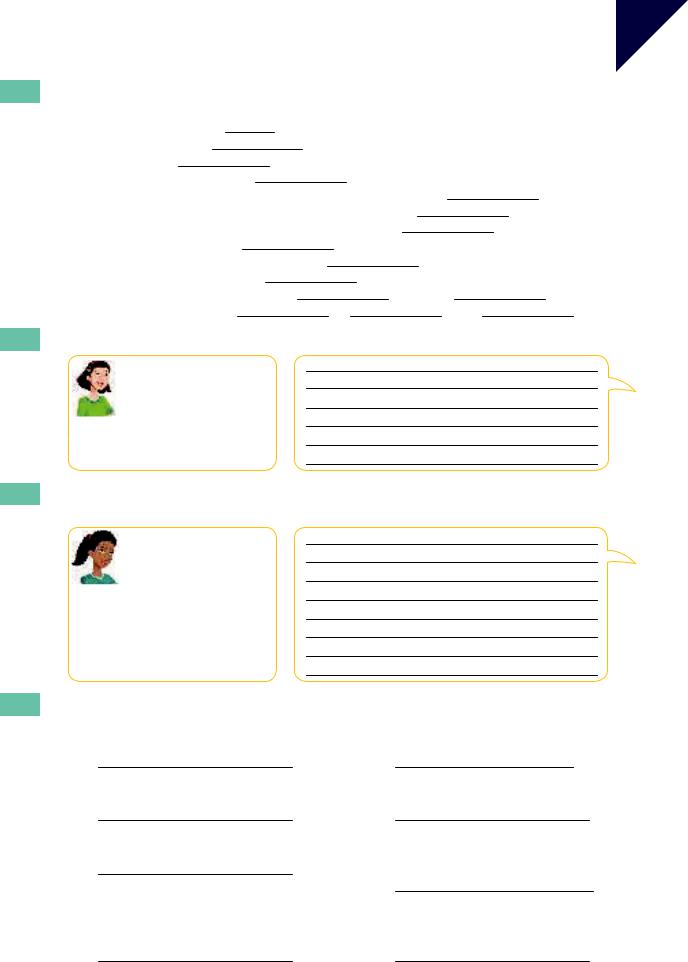
Exercises |
Unit |
51 |
|
|
|
51.1Complete each sentence with an auxiliary verb (do/was/could/might etc.). Sometimes the verb must be negative (don’t/wasn’t etc.).
1 |
I wasn’t tired, but my friends were . |
|
|
|
||
2 |
I like hot weather, but Ann |
|
. |
|
|
|
3 |
‘Is Andy here?’ |
‘He |
five minutes ago, but I think he’s gone home now.’ |
|||
4 |
I haven’t travelled much, but Gary |
|
|
. |
|
|
5 |
Lisa said she might come and see us tomorrow, but I don’t think she |
. |
||||
6 |
I don’t know whether to apply for the job or not. Do you think I |
? |
||||
7 |
‘Please don’t tell anybody what happened.’ |
‘Don’t worry. I |
.’ |
|||
8 |
‘You never listen to me.’ ‘Yes, I |
|
!’ |
|
|
|
9 |
I usually work on Saturdays, but last Saturday I |
. |
|
|||
10 |
‘Do you think it’s going to rain?’ ‘It |
|
|
. Take an umbrella in case.’ |
||
11 |
‘Are you and Chris going to the party?’ |
‘I |
|
, but Chris |
.’ |
|
12 |
‘Please help me.’ |
‘I’m sorry. I |
|
if I |
, but I |
.’ |
51.2 You never agree with Amy. Answer in the way shown.
1 |
|
I’m hungry. |
Are you? |
I’m not. |
2 |
|
I don’t like driving. |
Don’t you? |
I do. |
3 |
|
I like football. |
|
YOU |
|
|
|
||
4 |
AMY |
I didn’t enjoy the film. |
|
|
5 |
|
I’m not tired. |
|
|
6 I thought the exam was easy.
51.3Tina tells you something. If the same is true for you, answer with So … or Neither … (as in the first example). Otherwise, ask Tina questions (as in the second example).
1 |
I’m not tired. |
2 |
I work hard. |
3I watched TV last night.
4 |
TINA I won’t be at home tomorrow. |
5 |
I like reading. |
6I’d like to live somewhere else.
7 |
I can’t go out tonight. |
8I’m looking forward to the weekend.
Neither am I.
Do you? What do you do?
YOU
51.4 What do you say to Sam? Use I think so, I hope not etc.
1 |
(You don’t like rain.) |
|
5 |
(Jane has lived in Italy for many years.) |
|
|
SaM: Is it going to rain? |
|
|
SaM: Does Jane speak Italian? |
|
|
YOU: I hope not. |
(hope) |
|
YOU: |
(suppose) |
2 |
(You need more money.) |
|
6 |
(You have to leave Sam’s party early.) |
|
|
SaM: Do you think you’ll get a pay rise? |
|
|
SaM: Do you have to leave already? |
|
|
YOU: |
(hope) |
|
YOU: |
(afraid) |
|
|
|
|
||
3 |
(You’re going to a party. You can’t stand John.) |
7 |
(You’re not sure what time the film begins, but |
||
|
SaM: Will John be at the party? |
|
|
it’s probably 7.30.) |
|
|
YOU: |
(hope) |
|
SaM: What time is the film? 7.30? |
|
|
|
|
|
YOU: |
(think) |
|
|
|
|
|
|
4 |
(You’re not sure whether Amy is married, |
|
8 |
(You are the receptionist at a hotel. |
|
|
but she probably isn’t.) |
|
|
The hotel is full.) |
|
|
SaM: Is Amy married? |
|
|
SaM: Do you have a room for tonight? |
|
|
YOU: |
(think) |
|
YOU: |
(afraid) |
|
|
|
|
|
|
103
